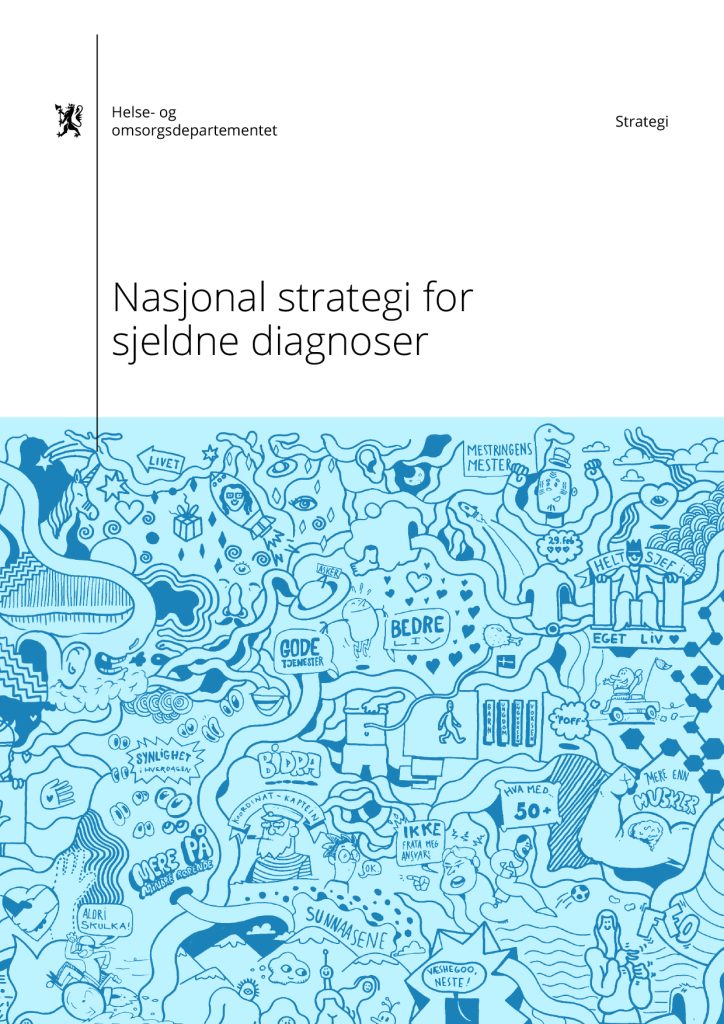Koalisjonen for sjeldne sykdommer (Koalisjonen) viser til Stortingets nettsider og invitasjonen til å delta på høring om Prop. 1S (2023-2024) for budsjettåret 2024 under Helse- og omsorgsdepartementet. Koalisjonen ber i dette høringsinnspillet om at Helse- og omsorgskomiteen:
- Sikrer en finansieringsmodell som adresserer kjente utfordringer for personer som lever med en sjelden diagnose.
- Følger opp at sjeldne diagnoser blir ivaretatt i den varslede prioriteringsmeldingen.
- Følger opp Nasjonal strategi for sjeldne diagnoser
Finansieringsordning som sikrer likeverdig tilgang til behandling
Mennesker som lever med sjeldne sykdommer, kan i dag oppleve at like tilfeller behandles ulikt avhengig av hvor de bor i landet på grunn av det økonomien til helseforetaket eller den enkelt klinikk avhengig av finansieringsmodellen til RHFene. De samme menneskene opplever også vanskeligere tilgang til legemiddelbehandling enn om de hadde tilhørt en større pasientgruppe.

De faste kostnadene til utvikling, distribusjon og oppfølging er i stor grad de samme for små og store pasientgrupper. Premisset med lavest mulig pris for finansiering av legemidler for sjeldne sykdommer slik det er i dag er ikke bærekraftig og medfører at norske borgere blir de tause taperne. Det er ikke rimelig at pasienter skal oppleve at de ikke får ta del i samfunnets fellesskap fordi de fikk tildelt et lodd i livet hvor de tilhører en mindre gruppe med genetiske mutasjoner. Man kan stille seg spørsmålet om komiteen hadde akseptert den samme behandlingen av eksempelvis pasienter med kreft eller diabetes.
Koalisjonen ber derfor komiteen i den kommende nasjonale Helse- og samhandlingsplanen sikrer at det utvikles en bærekraftig finansieringsmodell for behandling av sjeldne sykdommer som sikrer likeverdig tilgang for norske borgere med som lever med sjeldne sykdommer.
Prioriteringsmeldingen må sikre likebehandling av sjeldne diagnoser
Stortingets flertall ba i 2019 om at systemet for nye metoder skulle evalueres med bakgrunn i «utfordringen man ser i forbindelse med innføring av nye metoder til sjeldne sykdommer og andre små pasientgrupper, og mener beslutningsprosessene i større grad må ta høyde for disse».
Den endelige evalueringen fra PROBA Analyse ble overlevert til regjeringen i 2021, og pekte på at «Det er først og fremst utfordringer knyttet til persontilpasset medisin, avanserte terapier og behandlinger for sjeldne tilstander som vil gjøre seg gjeldende» i fremtiden.
Nye metoder har etter mye press fra referansegruppen tatt inn et strategisk mål på sjeldne diagnoser. Samtidig er det lite av Stortingets gjentatte føringer om å ivareta de sjeldne som speiles i signalene gitt for hva man ønsker å undersøke i en ny prioriteringsmelding.

Tilgangen til behandling er blitt dårligere. I IQVIA W.A.I.T rapporten fra 2023[1] viser at Norge bare har gitt tilgang til 34% av behandlingene for sjeldne sykdommer som ble godkjent av det europeiske legemiddelverket, til kontrast viste den samme rapporten i 2019[2] at Norge hadde gitt tilgang til 53% av samme type legemidlene. Rapportene viser en nedgang både i absolutte og relative tall.
Ingen av ekspertgruppene nedsatt av Regjeringen har fått i sitt mandat å greie ut om behandling av sjeldne diagnoser. Det er også uklart i hvilken utstrekning sjeldne sykdommer vil bli tilstrekkelig behandlet i den kommende prioriteringsmeldingen.
Det tar i dag gjennomsnittlig 5 år å få satt en sjelden diagnose[3], og 50% av personer med en sjelden diagnose i Europa mangler nettopp diagnose. Sjeldenregisteret ved OUS hadde per oktober 2023 3.200 personer i sitt register, med en estimert pasientgruppe på 320.000 mennesker er det et stort gap å dekke for å få en bedre oversikt som kan sikre tilgang til behandling, kliniske studier og forskning.
Disse utfordringene må adresseres i en ny prioriteringsmelding. Koalisjonen ønsker derfor at Helse- og omsorgskomiteen om å sikre at sjeldenhet blir tilstrekkelig drøftet i den kommende prioriteringsmeldingen.
Strategien for sjeldne diagnoser må følges opp
Det er gledelig å lese at Nasjonalt Kompetansetjeneste for Sjeldne Diagnoser (NKSD) får en realvekst på 2,7% i årets statsbudsjett. Dette er et viktig bidrag til å styrke kompetansebygging og kunnskapsspredning på sjeldne diagnoser.
Likevel er det som tidligere nevnt en stor pasientgruppe som går i mange år uten diagnose. Disse må også vente lenge på likeverdig og riktig behandling som er begrenset ettersom det er dårlig tilgang til forskningslitteratur[4]. Diagnose- og behandlingstilbudet er sterkt begrenset sett opp mot andre pasientgrupper av samme størrelser, og vil fortsette å være det til tross for stor og viktig innsats fra fagmiljøet, NKSD og de europeiske referansenettverkene.
Helse Sør Øst fikk i 2022 oppgave å utrede hvordan likeverdig og rask tilgang til høyspesialisert utredning, diagnostikk og behandling av personer med sjeldne diagnoser best kan ivaretas i spesialisthelsetjenesten. Dette er, så langt Koalisjonen kan finne, ennå ikke kvittert ut. Den siste oppdateringen viser til at det pågår flere europeiske prosjekt, blant annet European Reference Network, som er viktige støttepilarer for likeverdig og rask tilgang til diagnostisering og behandling, men det er viktig at dette ikke blir en hvilepute for spesialisthelsetjenesten.

Om Koalisjonen for sjeldne sykdommer
Koalisjonen for sjeldne sykdommer (Koalisjonen) arbeider for å bedre rammevilkårene for sjeldne sykdommer gjennom å aktivt delta i offentlige prosesser, arrangere og delta på møter, og delta i det offentlige ordskiftet. Koalisjonen har særlig arbeidet for å sikre en nasjonal finansiering for sjeldne sykdommer, et innføringssystem for nye metoder som tar høyde for de særegne markedsmekanismene som spiller inn i utviklingen av terapier til sjeldne diagnoser, og for å få på plass en nasjonal strategi for sjeldne diagnoser. Koalisjonen består i dag av de bioteknologiske selskapene Amicus, UCB, BioMarin, Chiesi og Sanofi.
[1] https://www.efpia.eu/media/s4qf1eqo/efpia_patient_wait_indicator_final_report.pdf
[2] https://www.efpia.eu/media/554526/patients-wait-indicator-2019.pdf
[3] https://ec.europa.eu/research-and-innovation/en/horizon-magazine/long-journey-rare-disease-diagnosis
[4] https://www.dagensmedisin.no/lik-behandling-forutsetter-lik-tilgang-til-oppdatert-kunnskap/568747

